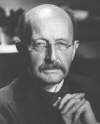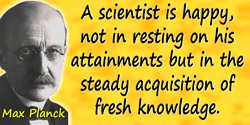 (source)
(source)
|
Max Planck
(23 Apr 1858 - 4 Oct 1947)
German theoretical physicist who introduced the quantum theory (1900), for which he was awarded the 1918 Nobel Prize for Physics. This assumes that energy is not infinitely subdivisible, but ultimately exists as discrete amounts he called quanta.
|
Max Planck Quotes on Truth (8 quotes)
>> Click for 71 Science Quotes by Max Planck
>> Click for Max Planck Quotes on | Absolute | Knowledge | Law | Nature | Research | Science | Thought |
>> Click for 71 Science Quotes by Max Planck
>> Click for Max Planck Quotes on | Absolute | Knowledge | Law | Nature | Research | Science | Thought |
Eine neue wissenschaftliche Wahrheit pflegt sich nicht in der Weise durchzusetzen, daß ihre Gegner überzeugt werden und sich als belehrt erklären, sondern vielmehr dadurch, daß ihre Gegner allmählich aussterben und daß die heranwachsende Generation von vornherein mit der Wahrheit vertraut gemacht ist.
A new scientific truth does not triumph by convincing its opponents and making them see the light, but rather its opponents eventually die, and a new generation grows up that is familiar with it.
A new scientific truth does not triumph by convincing its opponents and making them see the light, but rather its opponents eventually die, and a new generation grows up that is familiar with it.
— Max Planck
In Scientific Autobiography and Other Papers, trans. F. Gaynor (1950), 33. Also seen paraphrased in shortened form as: Die Wahrheit triumphiert nie, ihre Gegner sterben nur aus. (Translated as “Truth never triumphs—its opponents just die out.” More loosely paraphrased as “Science advances one funeral at a time.”)
It is not the possession of truth, but the success which attends the seeking after it, that enriches the seeker and brings happiness to him.
— Max Planck
In Max Planck and James Vincent Murphy (trans.), Where is Science Going?, (1932), 200.
Modern Physics impresses us particularly with the truth of the old doctrine which teaches that there are realities existing apart from our sense-perceptions, and that there are problems and conflicts where these realities are of greater value for us than the richest treasures of the world of experience.
— Max Planck
In The Universe in the Light of Modern Physics (1931), 107.
Science enhances the moral value of life, because it furthers a love of truth and reverence—love of truth displaying itself in the constant endeavor to arrive at a more exact knowledge of the world of mind and matter around us, and reverence, because every advance in knowledge brings us face to face with the mystery of our own being.
— Max Planck
In Max Planck and James Vincent Murphy (trans.), Where is Science Going?, (1932), 169.
The progress of science is an excellent illustration of the truth of the paradox that man must lose his soul before he can find it.
— Max Planck
In Max Planck and James Vincent Murphy (trans.), Where Is Science Going? (1932), 138.
The researcher might be tempted again and again to abandon his efforts as vain and fruitless, except that every now and then a light strikes across his path which furnishes him with irrefutable proof that, after all his mistakes in taking one by-path after another, he has at least made one step forward towards the discovery of the truth that he is seeking.
— Max Planck
From Nobel Prize acceptance speech (2 Jun 1920), as quoted and translated by James Murphy in 'Introduction: Max Planck: a Biographical Sketch' to Max Planck (trans.), Where is Science Going (1932), 24. This passage of Planck’s speech is translated very differently for the Nobel Committee. See elsewhere on this web page, beginning, “The whole strenuous…”.
The whole strenuous intellectual work of an industrious research worker would appear, after all, in vain and hopeless, if he were not occasionally through some striking facts to find that he had, at the end of all his criss-cross journeys, at last accomplished at least one step which was conclusively nearer the truth.
— Max Planck
Nobel Lecture (2 Jun 1920), in Nobel Lectures in Physics, 1901-1921 (1998), 407.
The whole strenuous intellectual work of an industrious research worker would appear, after all, in vain and hopeless, if he were not occasionally through some striking facts to find that he had, at the end of all his criss-cross journeys, at last accomplished at least one step which was conclusively nearer the truth.
— Max Planck
From Nobel Prize Lecture (2 Jun 1920), 'The Genesis and Present State of Development of the Quantum Theory', Nobel Lectures, Physics 1901-1921 (1967), and on the nobelprize.org web site. This passage of Planck’s speech is translated very differently by James Murphy in 'Introduction: Max Planck: a Biographical Sketch' in Max Planck and James Murphy (trans.), Where is Science Going (1932), 24. See elsewhere on this web page, beginning, “The researcher might…”.
See also:
- 23 Apr - short biography, births, deaths and events on date of Planck's birth.
- Where Is Science Going?, by Max Planck. - book suggestion.



 In science it often happens that scientists say, 'You know that's a really good argument; my position is mistaken,' and then they would actually change their minds and you never hear that old view from them again. They really do it. It doesn't happen as often as it should, because scientists are human and change is sometimes painful. But it happens every day. I cannot recall the last time something like that happened in politics or religion.
(1987) --
In science it often happens that scientists say, 'You know that's a really good argument; my position is mistaken,' and then they would actually change their minds and you never hear that old view from them again. They really do it. It doesn't happen as often as it should, because scientists are human and change is sometimes painful. But it happens every day. I cannot recall the last time something like that happened in politics or religion.
(1987) -- 


